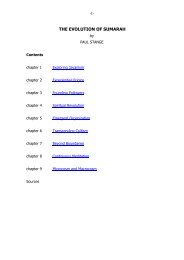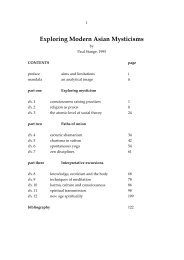Javanese Mystical and Marxist Dialectics - Paul Stange
Javanese Mystical and Marxist Dialectics - Paul Stange
Javanese Mystical and Marxist Dialectics - Paul Stange
You also want an ePaper? Increase the reach of your titles
YUMPU automatically turns print PDFs into web optimized ePapers that Google loves.
In Indonesia the difference is essential to underst<strong>and</strong>ing the communist attempt topoliticize the most mystically suffused portions of the population. My argument hereis that the Indonesian Communist Party (PKI) in effect functioned in terms of<strong>Javanese</strong> mystical rather than Western <strong>Marxist</strong> notions of power. More specifically,the suggestion is that the Javanization of the PKI resulted from a confluence of socioeconomic<strong>and</strong> ideological factors rather than simply from the limits of the politicalsituation. The effect was to unite the most traditional <strong>and</strong> most revolutionarycurrents in common opposition to modern Islam <strong>and</strong> Western capitalism. At thesame time, there was a split within the party between an elite which identified withthe last st<strong>and</strong> of the traditional aristocracy <strong>and</strong> a mass base which in effectconstituted the shattered remnants of that same order. The point is that the elite <strong>and</strong>mass shared a vocabulary having different implications depending on theperspective taken. This helps explain the tensions leading to the coups <strong>and</strong> killings of1965 <strong>and</strong> 1966.In making the case, I begin with a sketch of the main historical <strong>and</strong> social forcesbefore moving into discussion of the classical tradition <strong>and</strong> its relevance to Sukarno'sGuided Democracy. From there to evaluation of the Aidit phase of the PKI <strong>and</strong>finally to a summation of the relationships between the various traditions. A numberof critical conclusions follow. In the first place, I argue that both <strong>Javanese</strong> <strong>and</strong>peasant perspectives are fundamental to vision of this history <strong>and</strong> that those becomeclear through a dialectical image which simultaneously clarifies structure <strong>and</strong>process. Then in terms of scholarly method, my suggestion is that an interweaving ofsubject matter <strong>and</strong> researcher is essential to insight - in opposition to st<strong>and</strong>ardnotions of academic neutrality <strong>and</strong> objective disengagement. From first to last, Ist<strong>and</strong> with the <strong>Javanese</strong> mystic in his awareness that at base “all things are one” <strong>and</strong>with the <strong>Marxist</strong> in arguing that no particular makes sense apart from the whole.Suharto’s current military regime emerged in Indonesia in the wake of obscure coupsin Djakarta <strong>and</strong> the virtually unopposed slaughter of hundreds of thous<strong>and</strong>s in thevillages. While the details of the October 1965 coup are incidental here, the scope <strong>and</strong>ease of subsequent killings suggested previously unsuspected rural tensions <strong>and</strong>communist weakness. Even perceptive academic estimates of PKI power failed toaccount for the rapidity of disintegration in the early months of 1966. 1




